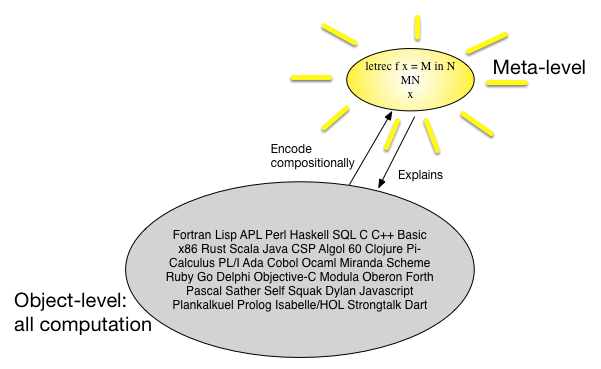I am familiar with operational semantics (both small-step and big-step) for defining programming languages. I'm interested in learning denotational semantics as well, but I'm not sure if it will be worth the effort. Will I just be learning the same material from a different point of view, or are there insights I can only gain from understanding denotational semantics?
2 Answers
There is no real agreement what characterises denotational semantics (see also this article), except that it must be compositional. That means that if $\newcommand{\SEMB}[1]{\lbrack\!\lbrack #1 \rbrack\!\rbrack} \SEMB{\cdot}$ is the semantic function, mapping programs to their meaning, something like the following must be the case for all $n$-ary program constructors $f$ and all programs $M_1$, ..., $M_n$ (implicitly assuming well-typedness):
$$ \SEMB{f(M_1, ..., M_n)} = trans(f) (\SEMB{M_1}, ..., \SEMB{M_n}) $$
Here $trans(f)$ is the constructor corresponding to $f$ in the semantic domain. Compositionality is similar to the concept of homomorphism in algebra.
Operational semantics is not compositional in this sense. Historically, denotational semantics was developed partly because operational semantics wasn't compositional. Following D. Scott's breakthrough order-theoretic denotational semantics of $\lambda$-calculus, most denotational semantics used to be order-theoretic. I imagine that -- apart from pure intellectual interest -- denotational semantics was mostly invented because at the time (1960s):
- It used to be difficult to reason about operational semantics.
- It used to be difficult to give axiomatic semantics to non-trivial languages.
Part of the problem was that the notion of equality of programs was not as well-understood as it is now. I'd argue that both problems have been ameliorated to a substantial degree, (1) for example by bisimilation based techniques coming from process theory (which can be seen as a specific form of operational semantics) or e.g Pitts work on operational semantics and program equivalence, and (2) by the developments of e.g. separation logic or Hoare logics derived as typed versions of Hennessy-Milner logics via programming language embeddings in typed π-calculi. Note that program logics (= axiomatic semantics) are compositional, too.
Another way of looking at denotational semantics is that there are many programming languages and they all look kind-of similar, so maybe we can find a simple, yet universal meta-language, and map all programming languages in a compositional manner to that meta-language. In the 1960s, it was thought that some typed $\lambda$-calculus is that meta-language. A picture might say more than 1000 words:
What is the advantage of this approach? Maybe it makes sense to look at it from an economic POV. If we want to prove something interesting about a class of object program we have two options.
Prove it directly on the object level.
Prove that the translation to the meta-level (and back) 'preserves' the property, and then prove it for the meta-level, and then push the result back to the object level.
The combined cost of the latter is probably higher than the cost of the former, but the cost of proving the translation can be amortised over all future uses, while the cost proving the property for the meta-level is much smaller than that of the proof on the object level.
The original order-theoretic approach to denotational semantics has so far not lived up to this promise, because complicated language features such as object orientation, concurrency and distributed computation have not yet been given precise order-theoretic semantics. By "precise" I mean semantics that matches the natural operational semantics of such languages.
Is it worth learning denotational semantics? If you mean order-theoretic approaches to denotational semantics, then probably not, unless you want to work in the theory of programming languages and need to understand older papers. Another reason for learning order-theoretic approaches to denotational semantics is the beauty of this approach.
I'll write $O(p,\sigma)$ for the only $\sigma'$ so that $\langle p, \sigma \rangle \to \sigma'$ (and $\bot$ if it doesn't exist) and $D(p)$ for the denotational semantics of $p$. Note that if you define both semantics properly, you'll most likely have $O(p,\sigma)=D(p)(\sigma)$. I'll write $S(p)$ to mean either $\sigma\mapsto O(p,\sigma)$ or $D(p)$.
Now take a compiler $C:X \to X'$. Saying that it's a compiler means that it preserves semantics, i.e. $S(C(p))=S'(p)$. If you were to try to prove that using operational semantics, you'd have to prove that for any $p$ and for any $\sigma$, $O(C(p),\sigma)=O'(p,\sigma)$. To prove it using denotational semantics, you only have to prove that for any $p$, $D(C(p))=D'(p)$. Not having to quantify on $\sigma$ often saves a lot of work.
Silly example:
$C(p)=$ replace all $(q;q')$ by $(skip;q;skip;q';skip)$.
In denotational semantics, you'll just do a proof by induction on $p$ and you'll easily get that $C$ is a compiler. In operational semantics, you'll have to take your derivations and plug pieces of derivations everywhere to account for the skips and it'll be a nightmare.

